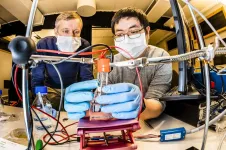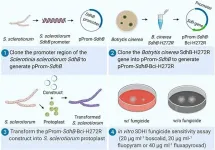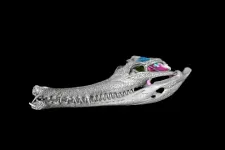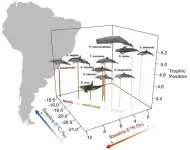(Press-News.org) A transplant of healthy gut microbes followed by fibre supplements benefits patients with severe obesity and metabolic syndrome, according to University of Alberta clinical trial findings published today in Nature Medicine.
Patients who were given a single-dose oral fecal microbial transplant followed by a daily fibre supplement were found to have better insulin sensitivity and higher levels of beneficial microbes in their gut at the end of the six-week trial. Improved insulin sensitivity allows the body to use glucose more effectively, reducing blood sugar.
"They were much more metabolically healthy," said principal investigator Karen Madsen, professor of medicine in the Faculty of Medicine & Dentistry and director of the Centre of Excellence for Gastrointestinal Inflammation and Immunity Research.
"These patients were on the best known medications (for metabolic syndrome) and we could improve them further, which shows us there is an avenue for improvement by targeting these different pathways in the microbiome."
Sixty-one patients with a body mass index of 40 or higher completed the double-blind, randomized trial. Recruited from the bariatric surgery waitlist in Edmonton, all had metabolic syndrome, a condition that includes insulin resistance, high blood glucose, high blood pressure and other complications. It can eventually lead to diabetes.
The microbiome is all of the bugs--micro-organisms, bacteria, viruses, protozoa and fungi--found in the gastrointestinal tract. People with various diseases are known to have altered microbial contents. It is not fully understood whether microbiome changes cause disease or whether disease causes changes in the gut, but it is likely a bit of both, Madsen said. It is known that replacing unhealthy bacteria with healthy bacteria can lead to improved health.
Fecal transplants, which contain microbes from healthy stool donors, are currently used extensively for treating Clostridium difficile, or C. difficile, bacterial infections, and research is underway to test their usefulness in treating other illnesses such as inflammatory bowel disease, mental health and metabolic disorders.
"We know that the gut microbiome affects all of these processes--inflammation, metabolism, immune function," said Madsen, who is a member of the Women and Children's Health Research Institute and is one of the University of Alberta leads for the national Microbiome Research Core (IMPACTT).
"The potential for improving human health through the microbiome is immense," Madsen said. "We are only scratching the surface at the moment."
This is the first study to show that oral delivery of fecal transplantation is effective in patients with obesity-related metabolic syndrome.
A previous study done in Europe on a small number of male patients with obesity and metabolic syndrome had shown promising results, but the transplants in that study were given through an invasive endoscopy (a tube down the throat) and the patients had milder disease.
The fecal microbial transplants in this study were from four lean, healthy donors, and were taken by mouth in a single dose of about 20 capsules prepared in a U of A lab. The capsules have no taste or odour.
The fibre supplements following the transplant were key to the success, Madsen said.
"When you transplant beneficial microbes, you need to feed them to keep them around," Madsen explained. "If you give a new microbe and you don't feed it, if you continue to eat a diet of processed foods and no fibre, then that microbe will likely die."
Our bodies do not naturally produce the enzymes needed to break down fibre, but that's what healthy bacteria in the microbiome need to live, thus the supplements. The team experimented with fermentable fibre (the kind found in beans, which produce gas) and non-fermentable fibre (essentially cellulose, found in whole grains).
"Non-fermentable fibre can change gut motility--how fast things move through--as well as acting as a bulking and binding agent that can change levels of bile acids, which could help explain our results," Madsen explained.
Madsen said the next step will be to do a longer study with more participants in multiple centres to learn how the transplant/fibre combination works and to monitor for changes in medication requirements, weight loss and other indicators. If results continue to show benefit, she said the pills could be available as a potential therapy within five years.
While scientists continue to narrow down which bacteria are the most beneficial for us, Madsen recommends we support the health of our own gut microbiome by eating fewer processed foods and more foods that contain fibre, such as whole grains, fruits and vegetables.
INFORMATION:
Funding for the trial was provided by the Weston Family Foundation, the University of Alberta Clinician Investigator Program and the Canadian Institutes for Health Research.
Researchers at Linköping University have developed a method that may lead to new types of displays based on structural colours. The discovery opens the way to cheap and energy-efficient colour displays and electronic labels. The study has been published in the scientific journal Advanced Materials.
We usually think of colours as created by pigments, which absorb light at certain wavelengths such that we perceive colour from other wavelengths that are scattered and reach our eyes. That's why leaves, for example, are green and tomatoes red. But colours can be created ...
Succinate dehydrogenase inhibitors (SDHIs) are a class of fungicides widely used to control many fungal diseases of crops. The relationship between SDHIs and fungi can be compared to finding the right key for the right lock. However, fungi are adaptable and develop resistance to fungicides often by changing the lock so that the SDHI is no longer able to open the door. Because of this adaptability, it is important to understand the biological mechanisms of fungicide resistance.
A recent collaboration between scientists in Michigan and Massachusetts as ...
However, the majority of these organisms are believed to be in a state a state of 'dormancy' due to environmental stress, such as nutrient-poor conditions. An international team of scientists led by Dagmar Woebken and Stephanie A. Eichorst from the University of Vienna investigated how acidobacteria, which are widespread in soils, can survive under adverse conditions. Two recent studies published in The ISME Journal and mSystems describe these survival strategies.
The living conditions that microorganisms encounter in soils are unpredictable and challenging. Nutrients and oxygen are frequently scarce for long periods. Acidobacteria manage to defy these extreme conditions. They are found in an astonishing diversity in soils worldwide. "Since they are this widespread, ...
The death of cells is well regulated. If it occurs too much, it can cause degenerative diseases. Too little, and cells can become tumours. Mitochondria, the power plants of cells, play a role in this programmed cell death. Scientists from the University of Groningen (the Netherlands) and the University of Pittsburgh (U.S.) have obtained new insights in how mitochondria receive the signal to self-destruct. Their results were published in the Journal of Molecular Biology.
How does a cell kill itself? The details of this process are still unclear. Patrick van der Wel, associate professor ...
PLYMOUTH MEETING, PA [July 6, 2021] -- New research in the June 2021 issue of JNCCN--Journal of the National Comprehensive Cancer Network assesses the quality of cancer care delivered through extended sites coordinated by some of the country's largest cancer centers. The study was developed to implement strategies for disseminating discoveries and expanding access to the highest quality cancer care as part of AACI's Network Care Initiative, established by former AACI President Stanton L. Gerson, MD, Director of the Case Comprehensive Cancer Center. Results were calculated based on responses to a mixed-methods survey answered by 69 cancer centers between September 2017 and December 2018, at which time 56 reported at ...
The braincase of crocodylians has a distinctive structure. Unlike evolutionary relatives (birds and squamates), in crocodylians, all braincase bones are rigidly fixed together and form an akinetic structure. In the process of evolution, this made it possible for animals to develop powerful jaws and stronger bite forces, thanks to which crocodylians could gnaw through the hard shell of crayfish and turtles and hunt fish and land animals, including dinosaurs. As a result, they have managed to fill the niche of predators and survive to the present day.
At present, in comparison with other parts of the crocodylian skull, the structure of their braincase has been understudied. This is because, until recently, scientists did not have ...
Dolphin species that live together, do not necessarily compete for food
A new molecular method reveals how different species of toothed whales compete for prey and which food they choose in each other's company. Marine scientists from NIOZ recently published their work in the scientific magazine Environmental Research.
Little is still known about the food and food search behaviour of toothed whales. What we know historically, is primarily derived from the stomach content of dead specimens. However, this makes it hard to actively study them in their natural habitat: you can't do more than wait for animals to wash ashore. Consequently, ...
Many standard economic models assume people make perfectly rational, individual decisions. But new research suggests economic phenomena like inequality and business cycles are better explained by models which recognize that people's decisions are affected by the decisions and the behaviors of people around them.
To show this, researchers built a model in which households are embedded in a social network that powerfully affects their savings decisions. This fairly simple model resulted in cyclical fluctuations resembling business cycles, as well as in emergent inequality - for instance, many poor households with low saving rates and a few rich households with high saving ...
* Clinical trial at University of Warwick compares the familiar cast, traditionally signed in sympathy, to modern removable brace for immobilising broken ankles
* Cast was not more effective, with patients reporting similar levels of pain and functionality, suggesting that choice should be down to patient preference and cost effectiveness
* Some data suggested a patient preference for the removable brace - sometimes referred to as the 'Beckham boot' after David Beckham
Using a cast is not more effective than a brace for treating broken ankles, according to University ...
An elegant new algorithm developed by Danish researchers can significantly reduce the resource consumption of the world's computer servers. Computer servers are as taxing on the climate as global air traffic combined, thereby making the green transition in IT an urgent matter. The researchers, from the University of Copenhagen, expect major IT companies to deploy the algorithm immediately.
One of the flipsides of our runaway internet usage is its impact on climate due to the massive amount of electricity consumed by computer servers. Current CO2 emissions ...






